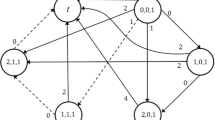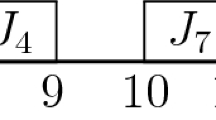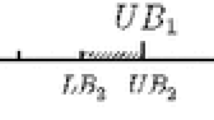Abstract
This paper provides two new perspectives on single-machine scheduling problems in which the objective involves penalties regarding late work. Both of this perspectives have been neglected in the previous literature. We begin by presenting a parameterized complexity analysis of the \(\mathcal{N}\mathcal{P}\)-hard problem of minimizing the total late work on a single machine. We do so with respect to the following four parameters: (i) the number of different processing times (\(\upsilon _{p}\)); (ii) the number of different due dates (\(\upsilon _{d}\)); (iii) the maximal processing time \(({p}_{\max });\) and (iv) the maximal due date (\(d_{\max }\)). We use results from the literature to conclude that the problem is hard with respect to (wrt.) parameter \(\upsilon _{d}\) and is tractable (i.e., solvable in FPT time) wrt. \(p_{\max }\). We then provide two FPT algorithms showing that the problem is also tractable wrt. to \(\upsilon _{p}\) and \(d_{\max }\). We continue by analyzing a single-machine scheduling problem with assignable due dates where the cost function to be minimized includes penalties due to weighted early and tardy work. We assume that each job can be assigned a different due-date, the value of which is subject to a job-dependent upper bound. We provide an efficient method to optimally assign due dates for a given job schedule. We then use this result to reduce the problem to a purely combinatorial problem, which we show is \(\mathcal{N}\mathcal{P}\)-hard in general, but solvable in either FPT time or polynomial time for some special cases.
Similar content being viewed by others
References
Adamopoulos, G. I., & Pappis, C. P. (1996). Single machine scheduling with flow allowances. The Journal of the Operational Research Society, 47(10), 1280–1285.
Assarzadegan, P., & Rasti-Barzoki, M. (2016). Minimizing sum of the due date assignment costs, maximum tardiness and distribution costs in a supply chain scheduling problem. Applied Soft Computing, 47, 343–356.
Błażewicz, J. (1984). Scheduling preemptible tasks on parallel processors with information loss. Technique et Science Informatiques, 3(6), 415–420.
Błażewicz, J., Ecker, K. H., Pesch, E., Schmidt, G., Sterna, M., & Weglarz, J. (2019). Handbook on scheduling. Springer.
Błażewicz, J., Chen, X., Lee, R. C., Lin, B. M. T., Lin, F. C., Pesch, E., Sterna, M., & Wang, Z. (2019). Clarification of lower bounds of two-machine flow-shop scheduling to minimize total late work. Engineering Optimization, 51(7), 1279–1280.
Chen, X., Sterna, M., Han, X., & Błażewicz, J. (2016). Scheduling on parallel identical machines with late work criterion: Offline and online cases. Journal of Scheduling, 19(6), 729–736.
Chen, X., Wang, Z., Pesch, E., Sterna, M., & Blazewicz, J. (2019). Two-machine flow-shop scheduling to minimize total late work: Revisited. Engineering Optimization, 51(7), 1268–1278.
Cheng, T. C. E., Ogaz, C., & Qi, X. D. (1996). Due-date assignment and single machine scheduling with compressible processing times. International Journal of Production Economics, 43, 29–35.
De, P., Ghosh, J. B., & Wells, C. E. (1991). Optimal delivery time quotation and order sequencing. Decision Sciences, 22(2), 379–390.
Downey, R., & Fellows, M. (1999). Parameterized complexity. Springer.
Engels, D., Karger, W., Kolliopoulos, D. R., Sengupta, S. G., Uma, R. N., & Wein, J. (2003). Techniques for scheduling with rejection. Journal of Algorithms, 49(1), 175–191.
Gerstl, E., Mor, B., & Mosheiov, G. (2019). Scheduling on a proportionate flowshop to minimise total late work. International Journal of Production Research, 57(2), 531–543.
Graham, R. L., Lawler, E. L., Lenstra, J. K., & Rinnooy Kan, A. H. G. (1979). Optimization and approximation in deterministic sequencing and scheduling: A survey. Annals of Discrete Mathematics, 5, 287–326.
Hariri, A. M. A., Potts, C. N., & Van Wassenhove, L. N. (1995). Single machine scheduling to minimize total weighted late work. ORSA Journal on Computing, 7(2), 232–242.
Hermelin, D., Shabtay, D., & Talmon, N. (2019). On the parameterized tractability of the just-in-time flow-shop scheduling problem. Journal of Scheduling, 22, 663–676.
Hermelin, D., Manoussakis, G., Pinedo, M., Shabtay, D., & Yedidsion, L. (2020). Parameterized multi-scenario single-machine scheduling problems. Algorithmica, 82(9), 2644–2667.
Hermelin, D., Karhi, S., Pinedo, M., & Shabtay, D. (2021). New algorithms for minimizing the weighted number of tardy jobs on a single machine. Annals of Operations Research, 298, 271–287.
Hermilen, D., Pinedo, M., Shabtay, D., & Zelig, C. (2021). A general scheme for scheduling with rejection in FPT time, Working Paper.
Janiak, A., Janiak, W., Kovalyov, M. Y., Kozan, E., & Pesch, E. (2013). Parallel machine scheduling and common due window assignment with job independent earliness and tardiness costs. Information Sciences, 224, 109–117.
Kovalyov, M., Potts, C. N., & Van Wassenhove, L. N. (1994). A fully polynomial approximation scheme for scheduling a single machine to minimize total weighted late work. Mathematics of Operations Research, 19(1), 86–93.
Lenstra, H. L. (1983). Integer programming with a fixed number of variables. Mathematics of Operations Research, 8(4), 538–548.
Li, S. S., & Chen, R. X. (2017). Common due date assignment and cumulative deterioration scheduling on a single machine. Engineering Optimization, 49(6), 976–989.
Li, S. S., & Yuan, J. J. (2020). Single-machine scheduling with multi-agents to minimize total weighted late work. Journal of Scheduling, 23, 497–512.
Lin, H., He, C., & Lin, Y. (2018). Bicriteria scheduling for due date assignment with total weighted tardiness. RAIRO-Operations Research, 52(2), 359–370.
Mnich, M., & Wiese, A. (2015). Scheduling and fixed-parameter tractability. Mathematical Programming, 154, 533–562.
Mnich, M., & van Bevern, R. (2018). Parameterized complexity of machine scheduling: 15 open problems. Computers and Operations Research, 100, 254–261.
Mor, B., & Mosheiov, G. (2017). A two-agent single machine scheduling problem with due-window assignment and a common flow-allowance. Journal of Combinatorial Optimization, 33, 1454–1468.
Mosheiov, G. (2003). Due-date assignment with asymmetric earliness-tardiness cost. Journal of the Operational Research Society, 54, 1222–1224.
Mosheiov, G., & Oron, D. (2021). A note on scheduling a rate modifying activity to minimize total late work. Computers & Industrial Engineering, 154, 107138.
Mosheiov, G., Oron, D., & Shabtay, D. (2021). Minimizing total late work on a single machine with generalized due-dates. European Journal of Operational Research, 293(3), 837–846.
Niedermeier, R. (2006). Invitation to fixed-parameter algorithms, Oxford lecture series in mathematics and its applications. Oxford Univerity Press, Oxford.
Panwalkar, S. S., Smith, M. L., & Seidmann, A. (1982). Common due date assignment to minimize total penalty for the one machine scheduling problem. Operations Research, 30, 391–399.
Panwalkar, S. S., & Rajagopalan, R. (1992). Single-machine sequencing with controllable processing times. European Journal of Operational Research, 59, 298–302.
Papadimitriu, C. H., & Steiglitz, K. (1982). Combinatorial optimization: Algorithms and complexity. Prentice-Hall.
Piroozfard, H., Wong, K. Y., & Wong, W. P. (2018). Minimizing total carbon footprint and total late work criterion in flexible job shop scheduling by using an improved multi-objective genetic algorithm. Resources, Conservation and Recycling, 128, 267–283.
Potts, C. N., & Van Wassenhove, L. N. (1991). Single machine scheduling to minimize total late work. Operations Research, 40, 586–595.
Potts, C. N., & Van Wassenhove, L. N. (1992). Approximation algorithms for scheduling a single machine to minimize total late work. Operations Research Letters, 11, 261–266.
Seidmann, A., Panwalkar, S. S., & Smith, M. L. (1981). Optimal assignment of due dates for a single processor scheduling problem. International Journal of Production Research, 19, 393–399.
Shabtay, D., & Steiner, G. (2008). Optimal due date assignment in multi-machine scheduling environments. Journal of Scheduling, 11(3), 217–228.
Shabtay, D. (2008). Due date assignments and scheduling a single machine with a general earliness/tardiness cost function. Computers and Operations Research, 35(5), 1539–1545.
Shabtay, D., Steiner, G., & Yedidsion, L. (2010). Bicriteria problems to minimize maximum tardiness and due date assignment cost in various scheduling environments. Discrete Applied Mathematics, 158(10), 1090–1103.
Shabtay, D., & Steiner, G. (2011). A bicriteria approach to minimize the total weighted number of tardy jobs with convex controllable processing times and assignable due dates. Journal of Scheduling, 14(5), 455–469.
Shabtay, D., Gaspar, N., & Kaspi, M. (2013). A survey on scheduling problems with rejection. Journal of Scheduling, 16(1), 3–28.
Shabtay, D. (2016). Optimal restricted due date assignment in scheduling. European Journal of Operational Research, 252(1), 79–89.
Steiner, G., & Zhang, R. (2011). Minimizing the weighted number of tardy jobs with due date assignment and capacity-constrained deliveries. Annals of Operations Research, 191(1), 171–181.
Sterna, M. (2011). A survey of scheduling problems with late work criteria. Omega, 39(2), 120–129.
Sterna, M. (2021). Late and early work scheduling: A survey. Omega, 104, 102453.
Van Bevern, R., Mnich, M., Niedermeier, R., & Weller, M. (2015). Interval scheduling and colorful independent sets. Journal of Scheduling, 18(5), 449–469.
Yin, Y., Xu, J., Cheng, T. C. E., Wu, C. C., & Wang, D. J. (2016). Approximation schemes for single-machine scheduling with a fixed maintenance activity to minimize the total amount of late work. Naval Research Logistics, 63(2), 172–183.
Yin, Y., Li, D., Wang, D., & Cheng, T. C. E. (2021). Single-machine serial-batch delivery scheduling with two competing agents and due date assignment. Annals of Operations Research, 298(1), 497–523.
Wang, D. J., Kang, C. C., Shiau, Y. R., Wu, C. C., & Hsu, P. H. (2017). A two-agent single-machine scheduling problem with late work criteria. Soft Computing, 21(8), 2015–2033.
Wang, D. J., Yin, Y., Cheng, S. R., Cheng, T. C. E., & Wu, C. C. (2016). Due date assignment and scheduling on a single machine with two competing agents. International Journal of Production Research, 54(4), 1152–1169.
Wu, C. C., Yin, Y., Wu, W. H., Chen, H. M., & Cheng, S. R. (2016). Using a branch-and-bound and a genetic algorithm for a single-machine total late work scheduling problem. Soft Computing, 20(4), 1329–1339.
Zhang, Y., & Yuan, J. (2019). A note on a two-agent scheduling problem related to the total weighted late work. Journal of Combinatorial Optimization, 37(3), 989–999.
Author information
Authors and Affiliations
Corresponding author
Additional information
Publisher's Note
Springer Nature remains neutral with regard to jurisdictional claims in published maps and institutional affiliations.
About this article
Cite this article
Shabtay, D. A new perspective on single-machine scheduling problems with late work related criteria. Ann Oper Res 322, 947–966 (2023). https://doi.org/10.1007/s10479-022-04806-0
Accepted:
Published:
Issue Date:
DOI: https://doi.org/10.1007/s10479-022-04806-0




